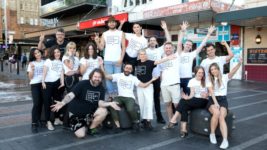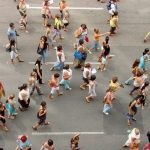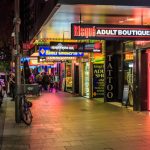Combating the NSW Nanny State: An Interview With Keep Sydney Open’s Tyson Koh

Next month marks five years since the Liberal Nationals government put a gun to the head of Sydney’s nightlife and pulled the trigger. Many Sydneysiders thought the lockout laws would never stick around very long, but today, they remain.
The pretext to the lockout laws was the one punch deaths of two 18-year-olds on the side of the road in the Cross. Thomas Kelly was punched on 7 July 2012 prior to 11 pm, while Daniel Christie came to tragedy on New Year’s Eve 2013 at around 9 pm.
So, how locking people out of Kings Cross and CBD venues after 1.30 am and calling last drinks at 3 was ever going to prevent further incidents such as these never made any sense.
The impact of these curfew laws is well known. Hundreds of nightclubs, bars, cafes, restaurants and related businesses were forced to close down. So, you can now almost hear a pin drop in the once bustling nightlife hubs of Kings Cross and Oxford Street.
And as the night time revellers left the Cross, the property developers moved in and started building apartment blocks on top of the sites that once housed the venues that made the local area globally renowned.
An assault on festivals
These days, NSW authorities have their sights firmly set on music festivals. Whether it’s saturation policing, drug dog operations, turning away punters found to be in possession of no illegal drugs or charging exorbitant user pays policing fees, festivals are clearly under attack.
Four young people have died at events in NSW this festival season. Following the first two drug-related deaths at the Defqon.1 festival in September, NSW premier Gladys Berejiklian established a panel to investigate safety at music festivals.
The unlikely group of experts on this subject that made up the panel were NSW police commissioner Mick Fuller, NSW chief health officer Dr Kerry Chant and Independent Liquor and Gaming Authority chair Philip Crawford.
The premier specifically told them not to consider pill testing: the tried and trusted method of combating harms at festivals in Europe. When the panel tabled its report, it recommended new tough on drug measures. Since then, two more young people have died.
From the chamber
On 19 of this month, a pill testing rally will take place at Sydney’s Town Hall. The event is being co-hosted by Keep Sydney Open: the organisation that formed in 2014 in opposition to the lockout laws. Over the years, the group has held rallies protesting the lockouts with huge turnouts.
And in January last year, Keep Sydney Open morphed into a political party. It will have 15 candidates running in the NSW Legislative Council in the March state election, as well as candidates running for the lower house in inner city seats.
Sydney Criminal Lawyers spoke to Keep Sydney Open campaign director Tyson Koh about why the organisation has turned to politics, the issues that will be the focus of its campaign and whether Sydney’s once great nightlife can be revived.
Firstly, next month it will be five years since the much-derided lockout laws have been in place. Tyson, how would you describe the effect these laws have had on our city in the half decade that they’ve been in force?
To be honest, it’s been quite heartbreaking. The centre of the city is now a ghost town. And for someone who has been going out in this city for almost two decades, I’ve witnessed the change.
Sydney was a place that felt like it was open to new experiences and opportunities. It was a place where you could bump into someone random on the street, meet them for the first time, and end up with a new best friend. But, that kind of energy is just not there anymore.
There are a lot of impacts on culture and subcultures. The city used to be a playground for all different tribes. It didn’t matter if you were a suit going for a drink after work, a raver, a skater or a punk, the city was a place where you could feel ownership. And Sydney is no longer that place.
So, what we are seeing now is these places that used to entertain these different groups have been turned into apartments. The entire chemistry of the city has changed. And it hasn’t been for the better.
The lockout laws were enacted by the O’Farrell government. The official line was they were brought in following deaths of two young men on the street in Kings Cross. But, in retrospect, as you’ve just mentioned, a lot of development has taken place in the area.
In your opinion, was there more behind these laws than just protecting people from random attacks on the street?
I would find it hard to believe that the long-term consequences of putting a curfew on the city would be lost on the government.
Essentially, what the government has done, is gutted the city’s night time economy. So, either it was planned, or the government was stupid. And I don’t think the government is stupid.
There are certainly some people in government and the community who were earnest about the lockout laws. But, the fact is that there was no justification for bringing them in.
We know that violence and assaults were in steady decline prior to the introduction of the lockouts. And what were one or two very tragic incidents could have been prevented by putting more cops on the street.
So, for the government to go for the heavy-handed option of a curfew over other measures that we know from looking at other cities does have a positive impact, it says that the politicians potentially did have other things on their minds.
Your party has stated that the lockout laws are just one aspect of “a broader sickness in NSW politics”. Can you elaborate further on this statement?
Obviously, we oppose the lockouts and the effect that they’ve had. But, for us, it’s more than just that. It’s actually the system of government that led to the lockouts being implemented.
The fact that there was no consultation with the relevant stakeholders. The fact that the government was completely oblivious to the effect on jobs, youth employment, small businesses, live music and culture. This shows that it’s completely out of touch.
When we say a broader sickness, we’re talking about the hypocrisy of allowing the casino to be exempt from this curfew, while the rest of the city suffers. It suggests that the government panders to big business, developers and special interests, over everyday people.
By registering as a political party, we want to get rid of the lockouts, but we also want to change the nature of government to prevent a decision like this from happening again.
The Keep Sydney Open Party has candidates running in the NSW March state election. What sort of platform are you running on? What are the key issues?
We’re responding to some very specific issues that have affected Sydney and the state over the last five years.
There’s this increasing acknowledgement that civil liberties in NSW have suffered. That includes the lockout laws: the ability to enjoy a band or dance to your favourite DJ at whatever hour you want.
It includes the way that festivals have been put under the microscope and the issue of pill testing. It’s that expectation that we have on government to keep people safe at these events, not shut them down. Civil liberties is one of our key issues.
The second is culture. And as far we can tell, there’s been no other political party formed specifically to support and shed light on issues affecting the cultural sector in NSW. At the moment, we are lagging behind other states in the country and other cities around the world.
We need a government that respects culture and its capacity to inspire people, to employ people and to improve liveability across the state.
Obviously, the night time economy is a central issue of ours. But, it’s not just about being able to go out late at night. It also involves small businesses, shopping, restaurants and also the services that are provided to be able to facilitate that economy as well.
So, 24 hour transport. They’ve had 24 hour trains running in Melbourne on the weekends for some time now. There are 24 hour trains running in New York and in London. If Sydney fancies itself as being an international city, we have to move towards being a 24 hour city.
The other issue is corruption. Both us and our supporters care deeply about this issue. And there’s a feeling among a lot of people that the government doesn’t have their best interests at heart. And it bends over backwards to appease big developers, big casino barons and mining companies.
When it comes to people’s everyday lives, their livelihoods and small businesses, the government just doesn’t give a damn.
So, stemming from the lockout laws there’s quite a broad range of issues that we aim to tackle with this state election.
You’re co-hosting a pill testing rally at Sydney’s Town Hall on 19 January. Despite the recent deaths at music festivals, the Liberal Nationals government is still refusing to even contemplate trialling this harm reduction strategy, which they’ve been consistently doing since early 2016.
Considering the evidence in regard to pill testing saving lives coming out of Europe, as well as the results from the Canberra trial last April, what do you think this ongoing reluctance to consider it amounts to?
Pure ignorance. We have a deeply conservative state government that is not willing to consider evidence-based solutions.
And unfortunately, the whole issue around recreational drugs has been framed in NSW as a law enforcement issue, when globally we’re seeing that the way forward is to put this issue into the hands of health experts that work in harm minimisation and drug policy.
The government put together a panel of people who for the most part did not have the professional experience to deal with this issue. And it gagged the entire panel regarding the consideration of pill testing as a way forward.
So, when we talk about a broader sickness, we’re talking about a government that refuses to choose the best solutions available.
If that’s the case with lockout laws and if that’s the case with pill testing, what other areas of policy are they also undermining best practice solutions for their own ham-fisted approach.
As you just mentioned the authorities in NSW are concentrating on law enforcement at music festivals, rather than harm reduction. What are the consequences of this overreliance on heavy-handed policing practices?
Both government and police play a vital role in society. Unfortunately, the bonds between those institutions and the public are being broken. And there are significant corners of the community that feel like NSW is becoming a police state.
This comes at the expense of best practice solutions, civil liberties, culture and freedom in NSW.
Instead of taking a reasonable approach forward and realising that the majority of the community support harm minimisation solutions, they’re issuing young people with court notices, putting them before judges and ruining their lives. And that approach isn’t helpful to anyone.
Tyson, you’ve remarked that what this all amounts to is that police are targeting young people and attendees of cultural events. In your opinion, why are police focusing on these groups?
Because young people are low hanging fruit. And there’s this deeply entrenched view among both government and police that where there’s music there’s trouble. Whereas there’s a lot of evidence that suggests enjoying music, dancing and seeing bands has a positive effect on anti-social behaviour.
We know that crime in just about every single category is falling. So, for the police to demonstrate that they’re being tough on crime, they have to hunt for criminality within otherwise well-meaning people.
We’re in an election year and the police are vying for more resources and more budget. And this is the easiest way for them to display a bit of muscle and justify more resources.
And lastly, as mentioned, it’s almost been five years since the lockouts have been around. A lot of Sydneysiders never imagined they would remain in place for so long.
How do you see this all playing out? Will the lockout laws be revoked? And how should the community guard against local authorities conducting such an assault upon Sydney’s nightlife culture in the future?
We’ve seen that the tide is already turning, in terms of public opinion and the various industries’ abilities to speak up. And certainly, we wouldn’t be devoting all our energy to this issue if we didn’t think that change was possible.
Keep Sydney Open has formed a political party, so people have an option at the election to vote on the basis of all of these issues that we’ve been discussing.
We have to remember that the Liberal government and the Labor opposition support lockout laws. So, we are posing a threat to them at the next election and what we need to see is a changing of guard in parliament.
Hopefully, Keep Sydney Open can represent the community after the next election and that other groups like us step forward to represent themselves too.
If something doesn’t seem right, such as a curfew, then people should exercise their democratic right and protest, not just take these issues lying down.
At the end of the day, the government does respond to a threat to its power and that’s why Keep Sydney Open is going to take the fight all the way to the election.







